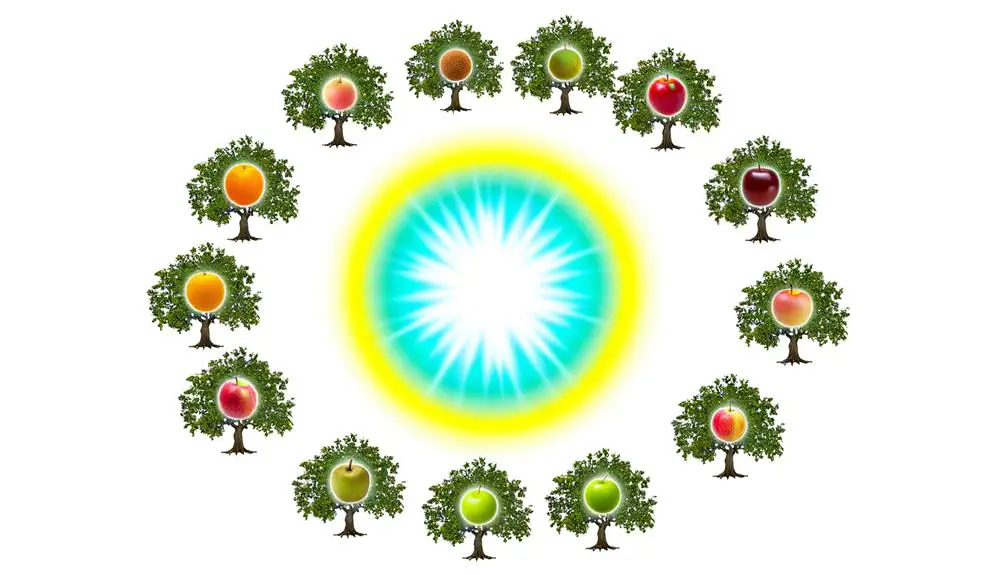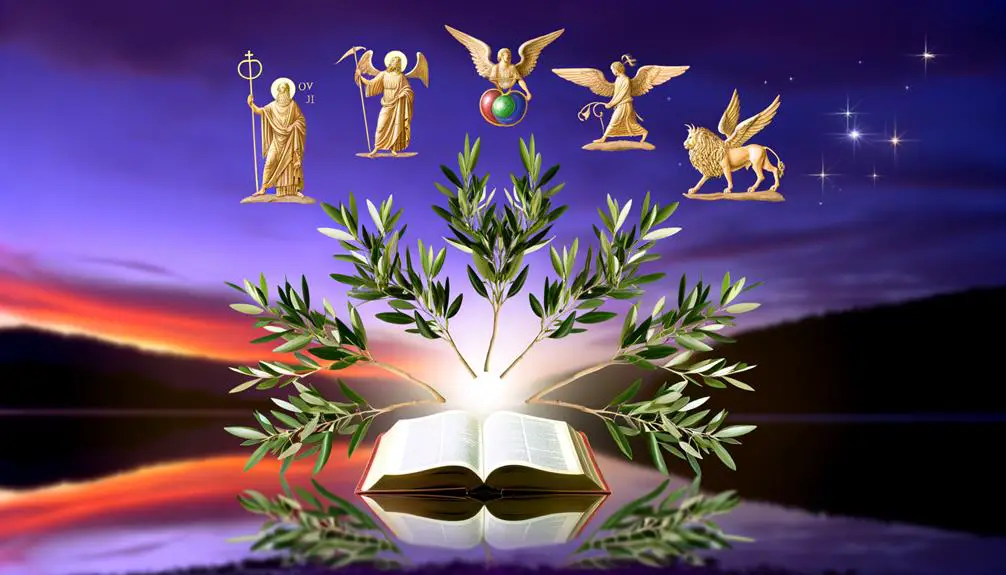Learn about the profound significance of the number nine in the Bible, a symbol of divine completeness and spiritual enlightenment.

Number Nine Meaning in the Bible
Just as Dante embarked on his journey through nine circles of Hell, you'll find that the number nine holds its own divine significance within the pages of the Bible.
This number isn't just a figure; it's a symbol woven intricately through the fabric of biblical teachings, from the Nine Fruits of the Spirit to Jesus Christ's crucifixion at the ninth hour.
You might wonder how such a simple number can bear so much weight in both the Old and New Testaments. Unpacking its meaning could offer you a deeper understanding of biblical messages and the divine design.
Key Takeaways
- Number nine symbolizes divine completeness, finality, and the fullness of God's blessings.
- It is associated with significant biblical events and teachings, including the Nine Fruits of the Spirit.
- Reflects the totality of God's plan, indicating significant transitions and the fulfillment of prophecies.
- Influences spiritual growth, emphasizing the importance of community and the unity of believers.
The Symbolism of Nine

Throughout history, the number nine has held significant symbolic weight in biblical contexts, often associated with finality and divine completeness. You'll find that nine's origin in these narratives is deeply intertwined with ancient beliefs and practices, revealing layers of meaning that transcend its simple numerical value.
In your exploration of this topic, it's crucial to understand that the symbolism attached to nine isn't a happenstance but a product of deliberate cultural interpretations that have evolved over millennia.
In the Bible, nine emerges in contexts that suggest a culmination of events or the completion of divine orders. This association isn't arbitrary. Instead, it reflects a broader cultural interpretation of numbers as carriers of spiritual and existential significance. For instance, the ancient Hebrews, among other cultures, practiced numerology, where numbers held specific symbolic meanings. In this worldview, nine represented not just an end but the highest state of spiritual achievement, a finality that precedes a new beginning.
Moreover, nine's symbolic significance extends beyond the biblical texts into broader cultural interpretations. Various cultures have seen it as a number of wisdom and initiation, often associated with the ability to see beyond the material world into the realm of the spiritual. This cultural backdrop enriches your understanding of nine's place in biblical narratives, highlighting its role not merely as a numeral but as a symbol of profound spiritual truth and completion.
Nine Fruits of the Spirit

In the Christian tradition, the number nine is profoundly significant, representing the nine Fruits of the Spirit as outlined in the biblical book of Galatians. These fruits are essential elements that reflect a believer's spiritual maturity and connection with the divine. The interpretation of these fruits isn't merely symbolic; it influences spiritual practices and ethical living.
The nine fruits are often seen as a holistic framework for Christian character development, emphasizing the transformation that comes from a life lived in accordance with the Holy Spirit. Each fruit embodies a particular virtue that, when cultivated, contributes to a well-rounded and spiritually rich life.
- Love: At the heart of the Fruits of the Spirit, love underscores all other virtues, advocating for a selfless and unconditional care for others.
- Joy: This fruit isn't dependent on external circumstances but is a state of inner delight and contentment in one's relationship with God.
- Peace: A tranquility of spirit that transcends worldly concerns, often cultivated through practices of prayer and meditation.
- Patience: This reflects a tolerance and forbearance towards others, even in challenging situations, inspired by an understanding of God's patience.
- Kindness: An active goodwill towards others, kindness is expressed through acts of generosity and considerate behaviors.
Fruit interpretations deeply inform spiritual practices by providing a blueprint for ethical living and personal growth. These virtues aren't innate but developed through intentional actions and a deepening relationship with the divine, marking a path for believers to follow in their quest for spiritual maturity.
Jesus Christ's Ninth Hour

One pivotal moment that encapsulates the profound symbolism of the number nine in biblical narratives is Jesus Christ's crucifixion at the ninth hour, a detail that holds deep theological significance. This specific crucifixion time isn't just a marker of the day's progression but is deeply intertwined with the customs and religious practices of the time, notably the Jewish afternoon prayer.
The ninth hour, or about 3 PM in today's timekeeping, was significant in Jewish tradition as a time for prayer. This moment, therefore, not only signifies the culmination of Christ's physical suffering but also aligns with a moment of spiritual observance, symbolizing a profound connection between divine intervention and human practice.
Aspect |
Significance |
|---|---|
Crucifixion Time |
Marks the fulfillment of prophecies and the culmination of Jesus's mission on earth. |
Afternoon Prayer |
Aligns Jesus's death with a time of religious significance, emphasizing the redemption aspect. |
The Number Nine |
Symbolizes divine completeness and finality, reflecting the completion of an era. |
Theological Impact |
Offers a deeper understanding of Jesus's sacrifice and its timing in the context of salvation. |
Cultural Context |
Connects the event to Jewish traditions, enriching the narrative's historical authenticity. |
Understanding Jesus Christ's crucifixion at the ninth hour requires a nuanced appreciation of its timing, which is laden with layers of religious and cultural symbolism. This moment doesn't just mark an end but also a transition, embodying both the fulfillment of divine will and the commencement of a new covenant between humanity and the divine.
Nine Gifts of the Spirit

You'll find that the concept of the Nine Gifts of the Spirit represents a foundational element in understanding the spiritual dynamics within the Christian faith.
These gifts, as outlined in the scriptures, play a pivotal role in the development and empowerment of believers.
Analyzing their overview and impact reveals the depth of their significance in both personal and communal contexts.
Spiritual Gifts Overview
Exploring the nine gifts of the Spirit reveals a profound dimension of Christian spirituality, emphasizing the diversity and power of these divine endowments. The origin of these gifts, as outlined in the scriptures, underscores their divine source and purpose in the believer's life. However, an understanding of gift origin is pivotal to prevent spiritual misuse, where gifts could be wrongly applied or recognized.
- Gift origin: Directly attributed to the Holy Spirit, highlighting divine intention and purpose.
- Spiritual misuse: A potential pitfall, underscoring the need for discernment and correct application.
- Diversity: Reflects a wide range of capabilities and functions within the Christian community.
- Empowerment: Enables believers to fulfill their God-given roles and missions.
- Divine endowment: Marks a supernatural bestowing of abilities, beyond mere human capacity.
Impact on Believers
Through the nine gifts of the Spirit, believers are endowed with capabilities that significantly influence their spiritual growth and community engagement.
From a believer's perspective, these gifts aren't just abstract blessings; they're tangible skills that foster a deeper connection with the divine and facilitate meaningful interactions within their communities.
These gifts serve as a bridge, linking personal faith with communal welfare, thereby reinforcing the believer's role in society from a spiritual standpoint.
Cultural interpretations of these gifts vary, reflecting diverse understandings and applications in different contexts. However, the core idea remains consistent: they're viewed as divine provisions for enhancing communal harmony and individual spiritual development.
This scholarly observation underscores the profound impact of these spiritual gifts on believers, shaping their identity and actions within their cultural and spiritual ecosystems.
Old Testament Significance

In the Old Testament, the number nine holds significant symbolic value, often associated with divine judgment and finality. This number's presence weaves a narrative of completeness and the fulfillment of God's plans through various historical and prophetic texts. It's crucial to examine the instances and contexts where nine emerges to grasp its profound implications.
- Nine Commandments: While the Bible doesn't explicitly list a set of 'Nine Commandments,' the number nine indirectly relates to the comprehensive nature of God's laws and their role in guiding moral and spiritual conduct.
- Leviathan's Reference: The enigmatic creature Leviathan, mentioned in the Book of Job, is linked to the number nine through complex interpretations of biblical numerology, symbolizing chaos and the eventual triumph of divine order.
- Nine Fruits of the Spirit: Although this concept is more directly related to the New Testament, its roots in Old Testament teachings underscore the completeness of God's spiritual provision for humanity.
- Divine Judgment: The number nine is often seen in contexts of judgment and finality, reflecting a completion of a cycle or fulfillment of divine decree.
- Prophetic Symbolism: In prophetic literature, nine can symbolize the end of an era and the beginning of divine intervention, marking pivotal moments in biblical history.
Understanding the number nine's role in the Old Testament reveals its depth as a symbol of divine completeness, judgment, and transformation. This analysis underscores the intricate relationship between numerology and theology, offering insights into the biblical narrative's foundational layers.
New Testament Revelations

In transitioning to the New Testament, you'll find that the number nine holds continued significance, particularly in the context of Revelations and spiritual gifts.
For instance, the symbolism of nine in the Book of Revelations and its association with finality and judgment is critical for understanding eschatological themes.
Additionally, Peter's vision and the enumeration of the nine gifts of the Spirit underscore the number's role in conveying divine completeness and empowerment in the Christian faith.
Nine's Symbolism in Revelations
Within the Book of Revelation, the number nine emerges with profound symbolic significance, reflecting themes of finality and divine completeness. This number is subtly interwoven into the narrative, serving as a cornerstone for interpreting angelic numerology and the culmination of divine judgment through the nine plagues. Its presence underscores the meticulous design of celestial messages and the ultimate resolution of human history.
- Nine plagues symbolize the comprehensive wrath of God.
- Angelic numerology offers insights into divine order and judgment.
- Represents the finality of God's plan for humanity.
- Suggests completeness in the cycle of divine retribution.
- Emphasizes the transformative power of divine intervention in Revelations.
In this context, nine serves as a reminder of both the severity and the completeness of divine action.
Peter's Vision: Nine's Role
Exploring further, Peter's vision in the New Testament reveals another dimension of the number nine, highlighting its significant role in early Christian revelations. This pivotal event, intertwined with Cornelius's encounter and the reevaluation of Dietary laws, marks a transformation in the understanding and acceptance of Gentiles within the Christian community.
Aspect |
Significance |
|---|---|
Cornelius's Encounter |
Catalyst for Peter's vision |
Dietary Laws |
Challenged and reinterpreted |
Gentile Acceptance |
Expanded through the vision |
Number Nine |
Symbolizes divine completeness |
The narrative does not merely recount an isolated incident but symbolizes a broader theological shift. The number nine, subtly interwoven, signifies a completion of a cycle, ushering in a new era of inclusivity and understanding within the early Christian fold.
Nine Gifts: Spiritual Significance
The New Testament delineates nine gifts of the Holy Spirit, each serving as a cornerstone for spiritual edification and empowerment within the Christian faith. These gifts underscore the significance of Nine's numerology, symbolizing Divine completion and fulfillment.
In this context, the gifts include:
- Prophecy
- Healing
- Miraculous powers
- Discerning of spirits
- Speaking in tongues
Each gift contributes uniquely to the body of Christ, facilitating unity and growth. The enumeration to nine is no coincidence; it aligns with biblical patterns that frequently associate nine with finality and the culmination of divine matters.
This alignment emphasizes the completeness of God's provision for His Church, illustrating how the spiritual gifts equip believers to fulfill their divine destinies, thus reflecting the encompassing nature of Divine completion inherent in Nine's numerology.
Nine Beatitudes Connection

Interestingly, the number nine holds a significant connection to the Beatitudes, as it mirrors the number of blessings Jesus delineated in the Sermon on the Mount. This correlation isn't merely numerical but deeply symbolic, offering insights into the spiritual significance embedded within both the Beatitudes and the number nine.
Exploring the Beatitude origins reveals that these blessings, articulated by Jesus, were revolutionary, presenting a counter-cultural blueprint for happiness and righteousness. They encapsulated core values of humility, mercy, purity, and peacemaking, fundamentally shifting perceptions of moral success.
Modern interpretations of the Beatitudes continue to unravel the layers of meaning behind each blessing, emphasizing their timeless relevance. The linkage with the number nine further enriches this analysis, suggesting a completeness and divine endorsement of these virtues. The number nine, in biblical numerology, often symbolizes finality and divine completeness. This connection posits the Beatitudes not just as arbitrary teachings but as a comprehensive, divinely ordained path to spiritual fulfillment.
Analyzing this connection between the number nine and the Beatitudes encourages a deeper appreciation for the meticulous structure and profound wisdom of biblical teachings. It's a reminder that these spiritual principles aren't outdated relics but vibrant, applicable truths. The alignment of the number of Beatitudes with the symbolism of the number nine underscores the holistic nature of Jesus' teachings, offering a blueprint for a fulfilled, righteous life that resonates with believers even today.
The Finality of Nine

In biblical numerology, nine's representation of finality and divine completeness holds profound implications for understanding scriptural teachings. This number doesn't just appear arbitrarily but is woven into the fabric of the Bible through deliberate numerical patterns, highlighting its significance in conveying messages of fulfillment and ultimate divine completion. When you delve into the scriptures, you'll recognize how nine serves as a capstone to various biblical concepts, illustrating the completion of divine works and the fulfillment of God's promises.
Here are some key aspects that underscore the finality of nine in biblical contexts:
- Divine completion: Nine symbolizes the culmination of God's work, as seen in the creation story and other biblical narratives.
- Judgment: The Day of Atonement, occurring on the ninth month, represents the completion of a cycle of judgment and reconciliation.
- Fruit of the Spirit: Galatians lists nine aspects of the Fruit of the Spirit, signifying the complete work of the Holy Spirit in a believer's life.
- Gestational period: Human gestation, typically lasting nine months, metaphorically echoes the themes of birthing and completion.
- Prophecy and revelation: The occurrences of nine in prophetic contexts often signal the completion of a divine message or era.
Understanding nine's role in these contexts enhances your appreciation for the Bible's intricate design and God's sovereignty in using numerical patterns to reveal deeper truths. It's a testament to the precision with which divine completion is orchestrated, underscoring the meticulousness of biblical revelation and its foundational truths.
Frequently Asked Questions
How Does the Number Nine Relate to Angelic Messages or Encounters in the Bible?
In exploring how the number nine connects to angelic messages in the Bible, you'll find it symbolizes divine completeness and fruitfulness. This isn't directly tied to angels but reflects a broader spiritual significance.
When angels do appear, their messages often align with themes of completion and the fulfillment of God's promises, indirectly linking to the number nine's symbolism.
You're seeing how biblical numerology and angelic encounters weave together to underline spiritual truths.
Are There Any Specific Prayers or Psalms That Mention the Number Nine Directly or Symbolically?
You're delving into a fascinating area, but you won't find direct mentions of the number nine in specific prayers or psalms.
However, the concepts of the Nine Commandments and Nine Beatitudes, while intriguing, aren't directly correlated with prayers or psalms either. These figures don't explicitly appear in the texts.
Instead, the significance of nine often emerges more broadly within biblical symbolism and doesn't tie directly to prayers or psalms in a straightforward manner.
Can the Number Nine Be Linked to the Prophetic Dreams or Visions Mentioned in the Bible?
You're exploring whether the number nine connects to dream interpretation or visionary symbolism in biblical texts.
While the Bible is rich with dreams and visions as divine communication, a direct link to the number nine isn't explicitly made in these contexts.
Your inquiry delves into the symbolic layer of biblical numerology, suggesting a nuanced analysis is needed to uncover any indirect associations between the number nine and prophetic dreams or visions within scripture.
How Does the Concept of Tithing or Offerings Relate to the Number Nine in Biblical Teachings?
In a nutshell, tithing or offerings don't directly tie to the number nine in biblical teachings. However, if you're fishing for a connection, consider the nine fruits of the Spirit, symbolizing divine completion in Christian character development.
These fruits reflect a believer's spiritual maturity and generosity, which can indirectly relate to the practice of giving tithes and offerings. Analytically, this showcases how biblical numerology and doctrines intertwine, enhancing understanding of scriptural principles.
Is There a Connection Between the Number Nine and the Biblical Patriarchs or Matriarchs Not Directly Mentioned in the Old Testament Significance Section?
You're looking for connections between the number nine and biblical patriarchs or matriarchs, specifically those not highlighted in the Old Testament's significance section. While traditional genealogy insights don't explicitly link them with the number nine, numerological interpretations suggest a deeper, more symbolic relationship.
These analyses often reveal layers of meaning that aren't immediately apparent, offering a richer understanding of these figures' roles and the symbolic power of numbers in biblical texts.
Conclusion
In analyzing the biblical significance of the number nine, you've uncovered its profound symbolism. From the nine Fruits and Gifts of the Spirit, to its pivotal role in Jesus Christ's crucifixion at the ninth hour, and its presence in the Old and New Testaments.
This number not only embodies spiritual fruitfulness and divine gifts but also marks moments of transformation and completion, reflecting a divine order in the realm of faith. Its repeated occurrence underscores a theme of finality and fulfillment, weaving a tapestry of divine design throughout the scriptures.



Sign up